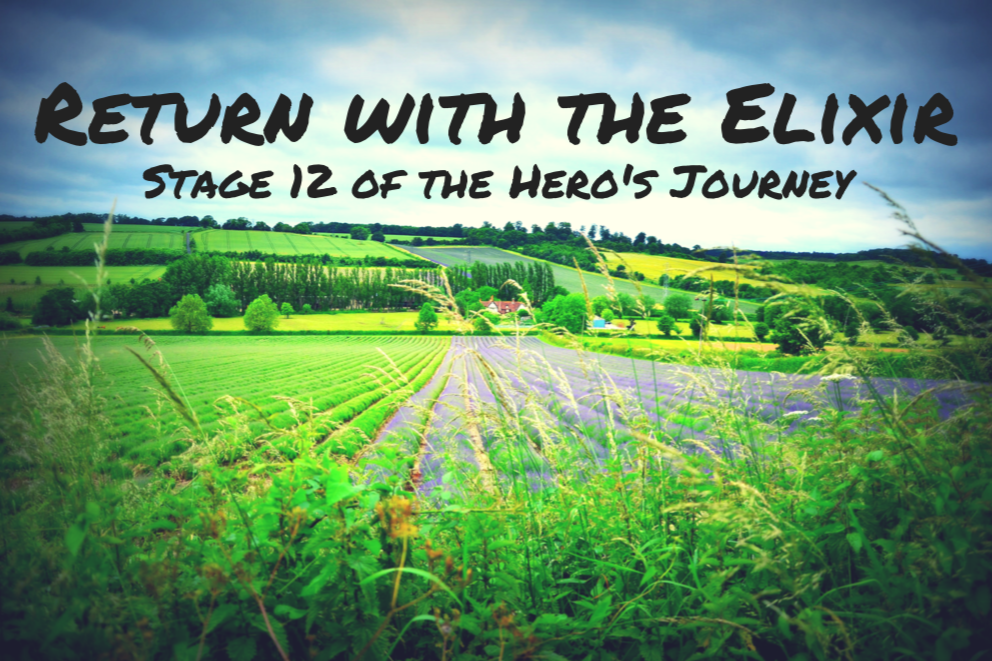Because everyone loves a good story
Stage Twelve: Return with the Elixir

Here we are at long last! Can you believe it? IT’S THE TWELFTH AND FINAL STAGE OF THE HERO’S JOURNEY! If you’ve been tracking with me throughout this series, I applaud you. Whether you’re an aspiring writer, an avid reader, a movie connoisseur, or a faithful friend who’s been plodding along just to humor me, I really do thank you. I hope you’ve enjoyed it as much as I have!
Anyway, enough with the sentiment. Let’s get down to the business of Stage Twelve: Return with the Elixir. What does the word elixir conjure up in your mind? Maybe a magical potion or a rare medicine? Maybe your crazy aunt who gets a little too excited about her essential oil concoctions? Well, I don’t have much to say about the last mental image, but the first examples are pretty close to what the hero brings home from his or her adventure. Vogler says, “If they are true heroes, they Return with the Elixir from the Special World; bringing something to share with others, or something with the power to heal a wounded land.” (221)
The Elixir in The Temple of Doom
Remember, the hero probably began the journey in the first place because something wasn’t right at home. Maybe a loved one was very sick or the family was struggling with poverty. In a fantasy story, someone could have been taken away or placed under a curse. Maybe the whole town was in trouble or even dying, as in Indiana Jones and the Temple of Doom. While this is my least-favorite Indiana movie (excepting the most recent travesty that should never have happened), it does provide a great example for this stage of the journey.
By a strange twist of events Indy, Willie, and Short Round end up in a remote Indian village that is dying. The villagers’ children have been taken away, and their sacred Sankara stone has been stolen. The fields are brown and brittle, and the people are destitute and heartbroken. When Indy finally returns—after some creepy adventures involving human sacrifice and voodoo dolls—he brings with him the children and the stone. The village is revived: fields are being harvested, flowers are blooming, water is flowing, and everyone rejoices to be reunited with their children. He has not returned emptyhanded; he has returned with the elixir.
Another Fancy French Literary Term
While this stage provides the solution to the main problem introduced at the beginning of the adventure, it should also provide resolution to the smaller issues. Sure, Frodo threw the ring into Mt. Doom and saved Middle Earth, but does the Fellowship get reunited? Is Aragorn crowned king? Does everyone return home? Does anyone trick his friends by hopping on a boat to the undying lands at the last minute? These questions would bother you if Tolkien had finished the story at the edge of Mt. Doom. Instead, he provides answers in the denouement.
Denouement (pronounced “day-noo-MAH”) is a French word that means “unknotting,” so it’s often used of the unknotting of various plot problems that became tangled throughout the story. Does this mean that when the hero returns with the Elixir, the story must be all wrapped up with a neat little bow on top? Not necessarily. “It’s all right for a Return to raise new questions,” Vogler says, “…but all the old questions should be addressed or at least restated.” (222)
Intangible Elixirs
So does every adventure need to have a physical elixir solving a physical problem at the end? Not at all. Vogler mentions several kinds of Elixirs, or “gifts” that the hero can bring back from the Special World of the adventure. Some examples include romantic love for the hero, change for the world around him, responsibility toward those he had neglected earlier, and wisdom in the face of mistakes. See, the elixir could be as intangible as a lesson learned or a heart won. “The best Elixirs,” Vogler points out, “are those that bring hero and audience greater awareness.” (227)
Example from The Hobbit
Our old friend, Bilbo Baggins, is no exception. While Bilbo’s treasure from the mountain is one part of his reward, I think the lessons he learned and the person (or hobbit) he became on the journey is his true elixir. He may have lost his reputation as a well-mannered, respectable hobbit, but he has gained far more. He has seen the world, and it has changed him for the better. He passes on to Frodo this elixir of experience—along with that blasted ring—and we all know how that turns out.
So What’s Next?
Whew! When we first began the Hero’s Journey, it seemed like we would never reach the end. But look at us now! Our journey is over, and our adventure is done. So what’s next? That’s what I want to know. I’ve got several ideas cooking, but I would love to hear from you. If there are any topics you’d enjoy reading about, then please feel free to leave me a comment below. Thanks again for following this journey, and I’ll see you next week!
Today’s Question: What do you want to talk about next? Give me some topics you’re interested in!
Sources:
Tolkien, J.R.R. The Hobbit. New York: Ballantine Books, 1937.
Vogler, Christopher. The Writer’s Journey: Mythic Structure for Writers, Second Edition. Studio City: Michael Wiese Productions, 1998.




Add a comment, and join the conversation!